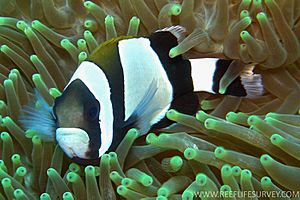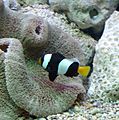Wide-band anemonefish facts for kids
Quick facts for kids Wide-band anemonefish |
|
|---|---|
 |
|
| Scientific classification |
The wide-band anemonefish (scientific name: Amphiprion latezonatus) is a type of anemonefish. You can find it in the warm, subtropical waters off the east coast of Australia.
Like all anemonefish, it lives in a special partnership called a symbiotic mutualism with sea anemones. The anemonefish is not harmed by the anemone's stinging tentacles. This fish is a sequential hermaphrodite. This means it can change its sex during its life. They have a strict pecking order based on size. The female is the largest, followed by the breeding male. Other non-breeding males are smaller. They show protandry. This means if the female dies, the breeding male changes into a female. Then, the largest non-breeding male becomes the new breeding male.
Contents
About the Wide-Band Anemonefish
The wide-band anemonefish can grow up to about 14 centimeters (5.5 inches) long. It has a dark brown body with three white stripes. Its tail fin has a wide white edge. The middle white stripe is very wide, about twice as wide as stripes on other anemonefish. It looks like a flat-topped pyramid. These fish have 10 spines on their back fin and two spines on their anal fin. They also have 15–16 soft rays on their back fin and 13–14 soft rays on their anal fin.
Colors and Patterns
The wide-band anemonefish often has bright blue marks on its upper lip. The edges of its white stripes can also be blue. Its dorsal fin (the fin on its back) might be orange or yellow.
Similar Fish Species
The wide, middle body stripe of the wide-band anemonefish makes it easy to spot. It is usually not confused with other anemonefish. The fish that look most like it are the saddleback anemonefish (A. polymnus) and the sebae anemonefish (A. sebae). However, the wide-band anemonefish has a wider middle stripe. It also lacks the sloped shape seen in A. polymnus or A. sebae.
Scientists used to identify anemonefish by how they looked. They also looked at things like scales on their head, tooth shape, and body size. These features helped group species together. The wide-band anemonefish was once thought to be part of the saddleback group. But genetic analysis (studying their DNA) showed something different. It showed that the wide-band anemonefish is unique. It is more closely related to the clownfish (A. percula) and the Premnas biaculeatus (maroon or spine-cheeked anemonefish). It is not as closely related to the saddleback group as once thought.
Where They Live
The wide-band anemonefish lives in the warm, subtropical waters of Australia. You can find them from southern Queensland to northern New South Wales. They also live around Norfolk Island and Lord Howe Island.
Host Anemones
Anemonefish do not just pick any sea anemone to live in. Their relationship with host anemones is very specific. The wide-band anemonefish is very picky. It usually lives with only one type of anemone, the sebae anemone (Heteractis crispa). However, scientists have found the wide-band anemonefish living in two other types of sea anemones as well.
Looking After Them
Anemonefish and the sea anemones they live with are found on coral reefs. They face similar problems in the ocean. Like corals, anemones have tiny living things called zooxanthellae inside them. These help them get food. But if the water gets too warm or too acidic, anemones can suffer from bleaching. This means they lose their zooxanthellae and can die.
Species that are at higher risk of disappearing often have a small living area. They might also have small local populations or be very picky about their habitat. The wide-band anemonefish lives only along the subtropical east coast of Australia. This makes it an endemic species. Finding them in two more types of sea anemones might help reduce their risk of disappearing. This species was not checked in the 2012 list of endangered species (the IUCN Red List).
In Fish Tanks
The wide-band anemonefish has been successfully bred in captivity. This means they can be raised in fish tanks.
Images for kids
See also
 In Spanish: Amphiprion latezonatus para niños
In Spanish: Amphiprion latezonatus para niños







